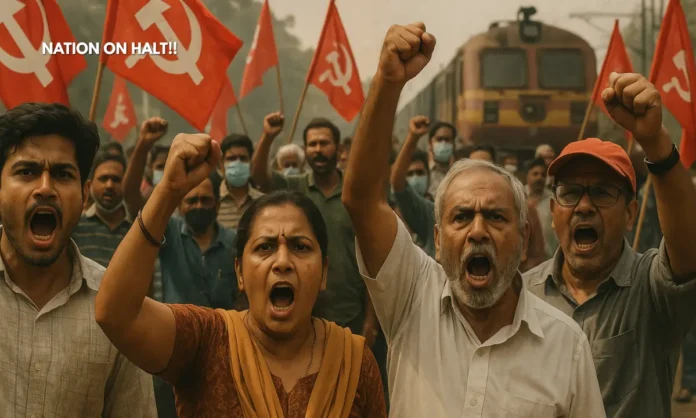SUMMARY
- Over 25 crore workers, including in banking, insurance, transport, and coal, joined a massive one-day strike on July 9.
- The protest challenged the Modi government’s economic reforms, privatization push, and controversial labor codes.
- Major disruptions hit Kerala, Odisha, West Bengal, and Delhi, with clashes, effigy burning, and railway blockades reported.
A Nation on Pause: Why July 9 Wasn’t Just Another Strike
On July 9, 2025, India witnessed one of the largest coordinated labor strikes in recent history. Titled Bharat Bandh, the shutdown was not a spontaneous outburst but a calculated move by over 10 central trade unions and allied farmer bodies. From bank clerks in Mumbai to coal miners in Jharkhand, from state transport staff in Tamil Nadu to postal workers in Delhi, more than 25 crore Indians halted their services. Their message was blunt: “Stop selling our railways. Don’t infringe upon trade union rights.”
At the heart of the protest lies a deep frustration with the Modi government’s economic reforms — reforms that trade unions say tilt dangerously in favor of corporates. Labor leaders claim new laws strip away hard-won protections, dilute wage security, and allow mass layoffs with minimal oversight. Paired with the aggressive push to privatize public sector undertakings (PSUs), the shutdown served as a nationwide vote of no confidence from India’s working class.
The scale and coordination of the strike underscore an emerging reality: India’s vast informal and formal labor sectors are not as divided as many presumed. From the railway stations of Kolkata to highways blocked in Tamil Nadu, the chant was the same — “Roll back the reforms, restore dignity to labor.”
🚨 Bharat Bandh: 25 crore workers strike across India.
— Daily Updates (@dailyupdates04) July 9, 2025
Banks, transport, postal services hit. Farmers join protests.
Demand: scrap new labour laws, raise wages, stop privatization.
Disruptions in Bengal, Bihar, Odisha; Tamil Nadu normal. pic.twitter.com/YCZdvKdDIB
Mass Mobilization and Economic Disruption Across States
- Coal mining operations halted in multiple states; banks, insurance, and manufacturing hit.
- Trains stopped by protestors in Kolkata, Mumbai, and Odisha.
- Over 30,000 workers detained in Tamil Nadu; services shut across Kerala.
Public life across major Indian cities faced notable disruptions. In Kolkata, protesters staged sit-ins at railway stations and torched effigies of Prime Minister Modi. In Kerala, roads emptied, schools shut down, and entire commercial zones observed a total shutdown. Odisha’s local transport services collapsed as vehicles stayed off the roads. And in Delhi, slogans demanding the rollback of four new labor codes echoed from Connaught Place to Jantar Mantar.
The coal sector, a pillar of India’s energy security, bore the brunt. Reports confirmed that coal mining operations were suspended in Jharkhand, Chhattisgarh, and parts of Telangana. Bank branches in Mumbai and Chennai remained shuttered as employees protested the privatization of public banks. Even refineries and petrol stations faced disruptions.
This wasn’t just a symbolic event. It was economic resistance with teeth.
What the Workers Want: Demands Beyond the Headlines
- Repeal of the four controversial labor codes.
- Halt to privatization of PSUs like banks, insurance, railways.
- Filling of over 10 lakh vacant posts in government sectors.
The crux of the Bharat Bandh’s demands lie in a 17-point charter submitted to Labour Minister Mansukh Mandaviya. Workers want a reversal of policies they describe as “anti-worker, anti-farmer, and anti-national.” This includes scrapping of the labor codes that allegedly weaken collective bargaining rights and formalize contractual labor over long-term employment.
Farmers’ groups — particularly from Punjab, Haryana, and Maharashtra — added their voice to the chorus, demanding guaranteed MSP (Minimum Support Price) and protection from corporate-driven land reforms. Women protestors like Maimoona Mollah and student leaders like Aishe Ghosh accused the government of stripping dignity from both urban and migrant workers, often left vulnerable to arbitrary layoffs and wage cuts.
Trade union leaders such as Amarjeet Kaur of the AITUC and Tapan Sen of CITU alleged the government was “serving capitalists while killing labor rights.” Their critique was sharp: while Modi’s government promises global investors “ease of doing business,” workers are being denied the right to secure, dignified livelihoods.
The Political Pulse: Between Reform and Resistance
- BJP faces credibility test as reforms collide with labor backlash.
- Opposition parties back protest but offer no concrete labor alternative.
- 2026 General Elections may turn into a referendum on Modi’s labor legacy.
The Bharat Bandh exposes a key friction at the heart of India’s economic story. While Prime Minister Modi has successfully pitched India as a global investment destination, his domestic labor policies are triggering rebellion. With over 90% of India’s workforce in the informal sector and increasingly excluded from formal protections, resentment has boiled over.
The BJP has not yet issued an official statement on the July 9 strike. But silence could signal a calculated gamble — banking on urban middle-class fatigue with labor strikes. Still, in states like West Bengal, Kerala, and Tamil Nadu, the ruling party may find itself on thin ice.
Opposition parties have largely backed the protests rhetorically, but failed to present a cohesive alternative labor policy. Meanwhile, the workers are watching. As India barrels toward the 2026 general elections, Bharat Bandh may be remembered as a turning point — not just for trade unions, but for the soul of India’s economic direction.
Labor on the Brink: A Tipping Point for India?
The July 9 Bharat Bandh was more than a work stoppage — it was a nationwide diagnosis of distrust. Workers are not just fighting for wages or benefits. They are resisting a vision of India where profit is prioritized over people, where reforms are drafted without consent, and where labor is seen as a cost — not a citizen.
If Modi’s government continues to ignore these signals, the backlash may not be limited to strikes. It could reshape the political narrative altogether.
Because when 25 crore people stop working to make a point, the country listens.


